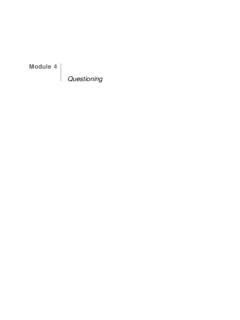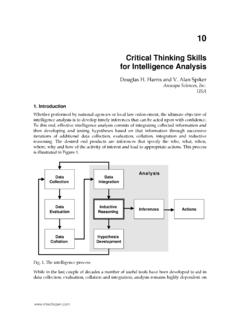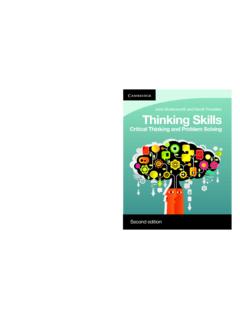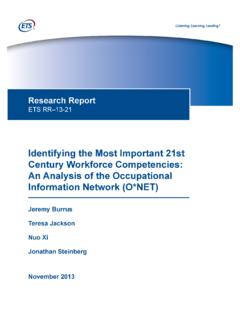Transcription of Thinking Skills: adding challenge to the curriculum
1 Thinking skills : adding challenge to the curriculum A guide for teachers of able children, published by the Scottish Network for Able Pupils (2000). Robert Fisher, Brunel University We learn most effectively when we think things through for ourselves.' (Scottish CCC, 1996). A good teacher makes you think, even when you don't want to.' Tom, aged 10. In recent years almost every curriculum report has emphasised the need to promote Thinking and reasoning in the curriculum . At the same time teachers and researchers have demonstrated that Thinking can be developed using a variety of approaches and programmes of study (McGuiness 1999). Effective implementation of the curriculum throughout primary and secondary years requires the development of effective forms of Thinking . The 5-14 guidelines for Scotland makes this explicit, for example English Lan- guage (p3) states that pupils should be provided with opportunities for speculating, hy- pothesizing, discovering, reflecting, generalizing, synthesising, classifying, evaluating', while Expressive Arts (p2) aims to promote pupils' cognitive development by including questioning, reasoning, problem solving and decision making; creative, imaginative, divergent Thinking .
2 ' The Mathematics and Environmental Studies guidelines emphasise problem solving and investigative skills . The 5-14 curriculum require pupils to reflect critically not only on their learning but also their values. The assumption is that Thinking and reasoning can help pupils identify, review and evaluate the values they and society hold and recognise that these affect thoughts and actions' (first aim of PSD 5-14). In England the rationale for the revised National curriculum (1999) states that Thinking skills are essential in learning how to learn'. Teaching Thinking is not viewed as a marginal activity but as an essential foundation on which to build a love of learning. But what think- ing do we need to teach, and how do we provide the challenge in the curriculum that will develop the Thinking skills of our most able pupils? What are Thinking skills ?
3 If learning is making sense of experience, and Thinking is how we learn, then improving pupils' Thinking skills will help them to make more sense of their learning and their lives. Thinking skills enable pupils to turn experience into learning. They focus on knowing how' rather than knowing that', on learning how to learn. Thinking skills are not an addition to the curriculum but are embedded in all subjects in the curriculum . They are present in all good teaching and learning. They are the founda- tion of personal development as well as making an important contribution to social and economic development by helping to develop students who have the capacity to think and act creatively, to meet challenges positively and effectively, and show initiative and enterprise in how they think and learn. The development of Thinking skills within the cur- riculum will help able pupils beyond school to benefit from opportunities for lifelong learn- ing.
4 Among the following Thinking skills described in this guide are: Thinking skills Cognitive goals (Bloom 1956). information-processing skills knowledge enquiry and problem solving skills comprehension and application critical Thinking and reasoning skills analysis creative Thinking skills synthesis evaluation skills evaluation In addition to these cognitive skills we need to help able children to develop what many psychologists believe to be a key element in human intelligence, the kinds of higher order Thinking involved in metacognition. We know that able children do best in classrooms where the work is intellectually chal- lenging ( Work that makes your brain hurt,' as Jody aged six put it). Such work will involve the child exercising both cognitive and metacognitive skills . So how do we help pupils develop these skills ? Creating challenge The most basic teaching strategy for day to day work in a mixed-ability classroom is differ- entiation, that is providing of a range of educational activities to meet the range of capa- bilities.
5 Different can mean expecting more, like the teacher who says of her abler pupils: I don't want one question/answer/solution, I want at least three!' However simply provid- ing more of the same is not always motivating for an able child. Few things are more frustrating to an able child than to held back doing routine work before moving on to a more stimulating task. As one able child complained about being given another worksheet on which he had to practice what he already knew: I can do this in my sleep. Its like a dream .. except its a nightmare!' Unfortunately he had a teacher who had the habit of giving children who finished more of the same, when what her able pupil wanted was a fresh cognitive challenge . Extension activity for more able pupils will not be challenging if it is: more practice at the same work, eg Go on to the next page'. additional work that is not reviewed or rewarded eg Do some more'.
6 Unfocused, open-ended activity eg See what you can find out ..'. Able pupils need opportunities both to engage in independent learning and to work with others. Evidence suggests that more able pupils are particularly stimulated and chal- lenged when they are given opportunities to engage in independent learning, following for example their own research projects and investigations with teacher support and feedback (1). One such child was ten year-old Max, who complained that the homework he was being given too easy. After some discussion about what sort of personal project he would like to do he was given his own homework book and proceeded over the next six weeks, in addition to other homework tasks, to write his first novel, showing and discussing each new chapter with his teacher and eventually publishing the book in the school for others to read and review.
7 When planning extension tasks we need to consider the kinds of abilities we wish to develop in pupils. The following Thinking skills can be developed through extension tasks that challenge the more able: 1. Finding out Information-processing skills enable pupils to: locate, collect and recall relevant information interpret information to show they understand relevant concepts and ideas analyse information eg sort, classify, sequence, compare and contrast understand relationships eg part/whole relationships Able children can develop expertise by researching and presenting a small project on any chosen topic. Offer challenge by expecting them to know or find out more than you know. Help them to identify where they might look, or who might help them to find out about subjects or topics of interest. Give them a difficult text to analyse, or two sources of evi- dence to compare and contrast or a challenging subject for research using the Internet.
8 2. Asking questions Enquiry skills enable pupils to: ask relevant questions pose and define problems plan what to do and ways to research, predict outcomes and test conclusions or improve ideas Provide opportunities for pupils to ask questions. Choose a topic, challenging text or mys- terious artefact and see how many questions they can generate. Create an enquiring environment in your classroom by valuing, displaying and discussing their questions. Pose your own challenging questions to encourage curiosity and creative Thinking eg How would you improve the human body?'. 3. Reasoning who, what, why, how, where and when Reasoning skills (critical Thinking ) enable pupils to: give reasons for opinions draw inferences and make deductions use precise language to explain what they think justify beliefs by the use of reasons and/or evidence Ask them to think of as many reasons as they can recycling waste materials, com- ing to school etc.
9 Ask them to summarise a book or film into 50 words. Ask them to find reasons for historical events eg Why did the evacuation of Dunkirk take place?' Encour- age reasoning and problem posing in maths eg If the answer is 48, what is the question? Explain the different and most interesting ways of arriving at that answer.'. 4. Thinking new ideas Creative Thinking skills enable pupils to: generate and extend ideas suggest possible hypotheses apply imagination to their Thinking look for alternatives in explanations and outcomes Ask them open-ended questions, such as Would you rather be .. (a bird or fish, child or grown-up etc.), or to hypothesise: What if ..? , Why ', What could you '; or to speculate about a hypothetical situation: Imagine the world without any trees, how would this affect our lives?'; to look at things in a different way, for example: What designs can you make from cobwebs?
10 '; or to apply imagination to what they already know, such as the ten year old who wrote her own sequel to the book she had just read - Wuthering Heights. 5. Making judgements Evaluation skills enable pupils to: evaluate information judge the value of what they read, hear and do develop criteria for judging their own and other's work have confidence in their personal judgements, forming their own points of view Ask them to judge and evaluate what they read eg by doing a PMI: What are the Plus points, Minus points and Interesting points about a given book or website? Ask them for up to 10 things that make eg a good book, a good friend, a good teacher, a good writer etc. - then rank them in order of importance. Discuss a controversial item in the news and ask them to write a letter expressing their point of view (see the Newswise website: ). Making space to think The following teaching strategies have been found to be successful in helping able pupils to extend their Thinking .








